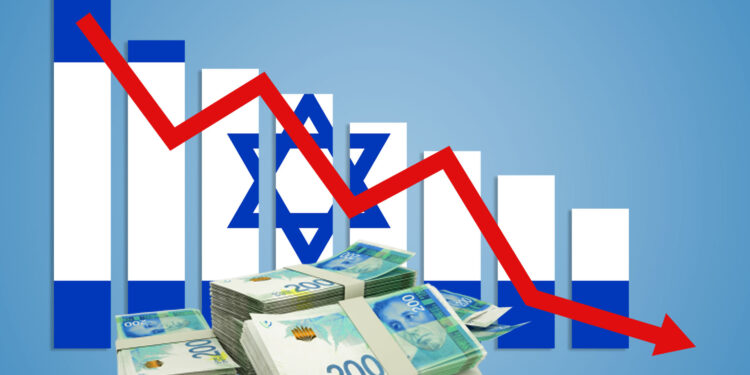A report by Israel’s Channel 12 warned that Israel is on the verge of a deep economic crisis due to war spending, and that this crisis will inevitably lead to financial inflation and a deepening of the deficit in the state treasury.
The report expected that this crisis would lead to raising taxes and cutting wages and social welfare allocations.
The report said that Israel has so far spent about $100 billion on the war. It pointed out that the cost of living index in Israel rose by nearly 1% during the last month, which could push tens of thousands of Israelis below the poverty line, at a time when growth in economic facilities has stopped, especially the high-tech sector, which has begun to decline.
The bank interest rate is among the highest when compared to Western countries, as well as the financial inflation rate, which has reached 3.6%, which keeps investors away from investing in various economic markets and facilities.
High inflation
Israel’s annual inflation rate rose to 3.6% last month from 3.2% in July, its highest level since October, data from the Central Bureau of Statistics showed on Sunday.
It was well above the 3.2% forecast in a Reuters poll and well above the government’s annual target range of 1% to 3%.
The consumer price index rose by a stronger-than-expected 0.9% in August from July, driven by higher costs for fresh produce, food, housing, transportation, education and recreation, only partly offset by declines in clothing and footwear, communications and furniture.
In August, increases were recorded in the costs of fresh vegetables, which jumped 13.2%, transportation costs rose 2.8%, housing by 0.6%, and culture and entertainment by 0.5%, according to the statistics office.
According to the data, clothing prices fell by 4.1%, refined petroleum products by 5.9%. In the real estate market, rents upon renewal of contracts rose by 2.6%, and rents upon new tenants’ contracts by 5.3%.
This rise in inflation reduces the chances of further interest rate cuts, and government officials have largely blamed the rise in inflation on the supply side of goods and services linked to the war on the Gaza Strip.
After a record rate cut in January, the Bank of Israel kept the interest rate unchanged at subsequent meetings in February, April, May, July and August, citing geopolitical tensions, rising price pressures and fiscal policy easing due to Israel’s war on Gaza.
The Bank of Israel is scheduled to make a decision on interest rates on October 9, and Bank of Israel experts said they do not expect interest rates to be cut until 2025.
The Central Bank has repeatedly expressed concern about the impact of the Gaza war on inflation.
Additional budget
It is noteworthy that the war prompted the Knesset (Israeli parliament) to pass an increase in the previously approved additional budget for the 2024 fiscal year to reach 727.4 billion shekels ($192 billion).
The Knesset approved the new increase of 3.4 billion shekels ($924 million) to help finance the evacuation of civilians and the spending of reserve soldiers until the end of this year.
As the war dragged on longer than expected, the original budget was insufficient to cover the increasing costs. Therefore, it was recognized that there was a need to increase civilian spending to meet the consequences of the ongoing war.
As a result, the Israeli government has earmarked increased civilian spending to address the ongoing effects of the war, with the second budget aimed at addressing the financial impact of the extended war.



